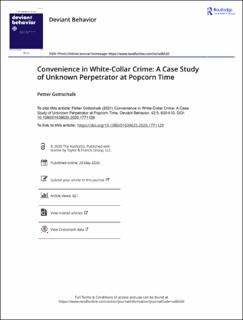| dc.contributor.author | Gottschalk, Petter | |
| dc.date.accessioned | 2021-06-29T11:13:50Z | |
| dc.date.available | 2021-06-29T11:13:50Z | |
| dc.date.created | 2020-05-22T14:06:00Z | |
| dc.date.issued | 2020 | |
| dc.identifier.citation | Deviant Behavior, 2021, 42 (5), 600-610 | en_US |
| dc.identifier.issn | 0163-9625 | |
| dc.identifier.uri | https://hdl.handle.net/11250/2762316 | |
| dc.description.abstract | The theory of convenience suggests that characteristics of white-collar offenders include motive, opportunity, and willingness for deviant behavior. This article discusses the case of offenders developing and supporting the software platform Popcorn Time. The motive seems to be sensation seeking with a deviant identity. The opportunity seems to be unknown and anonymous identity of offenders based on the lack of oversight and guardianship on the Internet. The willingness seems to be lack of self-control as well as disclaim of responsibility for violations of intellectual property rights. A structural model of convenience theory is applied to the case study. | en_US |
| dc.language.iso | eng | en_US |
| dc.publisher | Taylor and Francis | en_US |
| dc.rights | Attribution-NonCommercial-NoDerivatives 4.0 Internasjonal | * |
| dc.rights.uri | http://creativecommons.org/licenses/by-nc-nd/4.0/deed.no | * |
| dc.title | Convenience in White-Collar Crime: A Case Study of Unknown Perpetrator at Popcorn Time | en_US |
| dc.type | Journal article | en_US |
| dc.type | Peer reviewed | en_US |
| dc.description.version | publishedVersion | en_US |
| dc.source.pagenumber | 600-610 | en_US |
| dc.source.volume | 45 | en_US |
| dc.source.journal | Deviant Behavior | en_US |
| dc.source.issue | 5 | en_US |
| dc.identifier.doi | 10.1080/01639625.2020.1771129 | |
| dc.identifier.cristin | 1812174 | |
| cristin.ispublished | true | |
| cristin.fulltext | postprint | |
| cristin.qualitycode | 1 | |

